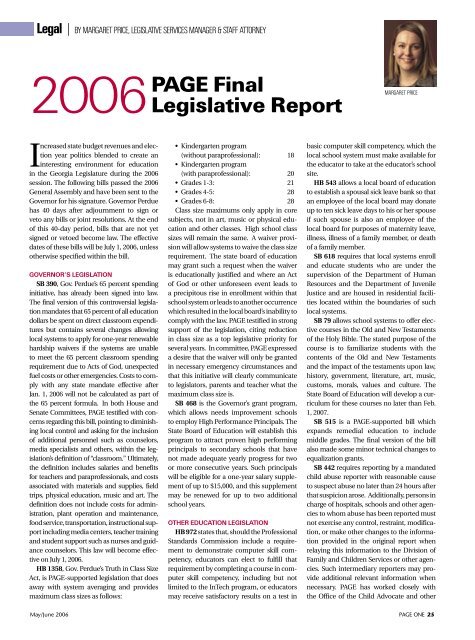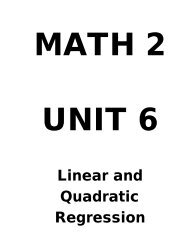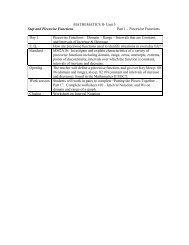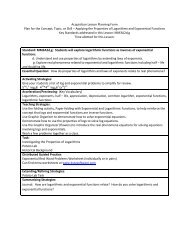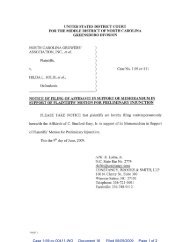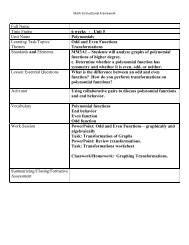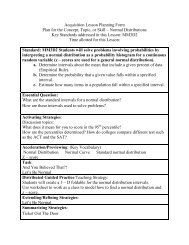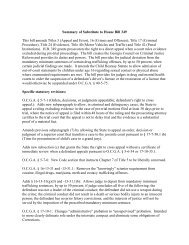Your life doesn't stop - Ciclt.net
Your life doesn't stop - Ciclt.net
Your life doesn't stop - Ciclt.net
Create successful ePaper yourself
Turn your PDF publications into a flip-book with our unique Google optimized e-Paper software.
Legal | BY MARGARET PRICE, LEGISLATIVE SERVICES MANAGER & STAFF ATTORNEY<br />
PAGE Final<br />
2006Legislative Report<br />
MARGARET PRICE<br />
Increased state budget revenues and election<br />
year politics blended to create an<br />
interesting environment for education<br />
in the Georgia Legislature during the 2006<br />
session. The following bills passed the 2006<br />
General Assembly and have been sent to the<br />
Governor for his signature. Governor Perdue<br />
has 40 days after adjournment to sign or<br />
veto any bills or joint resolutions. At the end<br />
of this 40-day period, bills that are not yet<br />
signed or vetoed become law. The effective<br />
dates of these bills will be July 1, 2006, unless<br />
otherwise specified within the bill.<br />
GOVERNOR’S LEGISLATION<br />
SB 390, Gov. Perdue’s 65 percent spending<br />
initiative, has already been signed into law.<br />
The final version of this controversial legislation<br />
mandates that 65 percent of all education<br />
dollars be spent on direct classroom expenditures<br />
but contains several changes allowing<br />
local systems to apply for one-year renewable<br />
hardship waivers if the systems are unable<br />
to meet the 65 percent classroom spending<br />
requirement due to Acts of God, unexpected<br />
fuel costs or other emergencies. Costs to comply<br />
with any state mandate effective after<br />
Jan. 1, 2006 will not be calculated as part of<br />
the 65 percent formula. In both House and<br />
Senate Committees, PAGE testified with concerns<br />
regarding this bill, pointing to diminishing<br />
local control and asking for the inclusion<br />
of additional personnel such as counselors,<br />
media specialists and others, within the legislation’s<br />
definition of “classroom.” Ultimately,<br />
the definition includes salaries and benefits<br />
for teachers and paraprofessionals, and costs<br />
associated with materials and supplies, field<br />
trips, physical education, music and art. The<br />
definition does not include costs for administration,<br />
plant operation and maintenance,<br />
food service, transportation, instructional support<br />
including media centers, teacher training<br />
and student support such as nurses and guidance<br />
counselors. This law will become effective<br />
on July 1, 2006.<br />
HB 1358, Gov. Perdue’s Truth in Class Size<br />
Act, is PAGE-supported legislation that does<br />
away with system averaging and provides<br />
maximum class sizes as follows:<br />
• Kindergarten program<br />
(without paraprofessional): 18<br />
• Kindergarten program<br />
(with paraprofessional): 20<br />
• Grades 1-3: 21<br />
• Grades 4-5: 28<br />
• Grades 6-8: 28<br />
Class size maximums only apply in core<br />
subjects, not in art, music or physical education<br />
and other classes. High school class<br />
sizes will remain the same. A waiver provision<br />
will allow systems to waive the class size<br />
requirement. The state board of education<br />
may grant such a request when the waiver<br />
is educationally justified and where an Act<br />
of God or other unforeseen event leads to<br />
a precipitous rise in enrollment within that<br />
school system or leads to another occurrence<br />
which resulted in the local board’s inability to<br />
comply with the law. PAGE testified in strong<br />
support of the legislation, citing reduction<br />
in class size as a top legislative priority for<br />
several years. In committee, PAGE expressed<br />
a desire that the waiver will only be granted<br />
in necessary emergency circumstances and<br />
that this initiative will clearly communicate<br />
to legislators, parents and teacher what the<br />
maximum class size is.<br />
SB 468 is the Governor’s grant program,<br />
which allows needs improvement schools<br />
to employ High Performance Principals. The<br />
State Board of Education will establish this<br />
program to attract proven high performing<br />
principals to secondary schools that have<br />
not made adequate yearly progress for two<br />
or more consecutive years. Such principals<br />
will be eligible for a one-year salary supplement<br />
of up to $15,000, and this supplement<br />
may be renewed for up to two additional<br />
school years.<br />
OTHER EDUCATION LEGISLATION<br />
HB 972 states that, should the Professional<br />
Standards Commission include a requirement<br />
to demonstrate computer skill competency,<br />
educators can elect to fulfill that<br />
requirement by completing a course in computer<br />
skill competency, including but not<br />
limited to the InTech program, or educators<br />
may receive satisfactory results on a test in<br />
basic computer skill competency, which the<br />
local school system must make available for<br />
the educator to take at the educator’s school<br />
site.<br />
HB 543 allows a local board of education<br />
to establish a spousal sick leave bank so that<br />
an employee of the local board may donate<br />
up to ten sick leave days to his or her spouse<br />
if such spouse is also an employee of the<br />
local board for purposes of maternity leave,<br />
illness, illness of a family member, or death<br />
of a family member.<br />
SB 618 requires that local systems enroll<br />
and educate students who are under the<br />
supervision of the Department of Human<br />
Resources and the Department of Juvenile<br />
Justice and are housed in residential facilities<br />
located within the boundaries of such<br />
local systems.<br />
SB 79 allows school systems to offer elective<br />
courses in the Old and New Testaments<br />
of the Holy Bible. The stated purpose of the<br />
course is to familiarize students with the<br />
contents of the Old and New Testaments<br />
and the impact of the testaments upon law,<br />
history, government, literature, art, music,<br />
customs, morals, values and culture. The<br />
State Board of Education will develop a curriculum<br />
for these courses no later than Feb.<br />
1, 2007.<br />
SB 515 is a PAGE-supported bill which<br />
expands remedial education to include<br />
middle grades. The final version of the bill<br />
also made some minor technical changes to<br />
equalization grants.<br />
SB 442 requires reporting by a mandated<br />
child abuse reporter with reasonable cause<br />
to suspect abuse no later than 24 hours after<br />
that suspicion arose. Additionally, persons in<br />
charge of hospitals, schools and other agencies<br />
to whom abuse has been reported must<br />
not exercise any control, restraint, modification,<br />
or make other changes to the information<br />
provided in the original report when<br />
relaying this information to the Division of<br />
Family and Children Services or other agencies.<br />
Such intermediary reporters may provide<br />
additional relevant information when<br />
necessary. PAGE has worked closely with<br />
the Office of the Child Advocate and other<br />
May/June 2006 PAGE ONE 25


